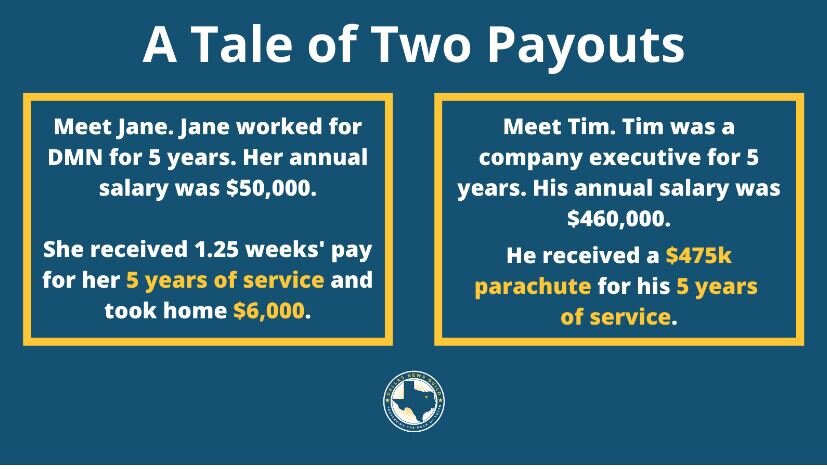Thank you for your service
Employee loyalty should be reciprocated with a competitive severance policy
Meet Jane Doe, 37 years old, a Dallas Morning News employee for five years.
(Note this is actually an example used in Belo’s “How the Severance Plan Works” policy document.)
Suddenly, without warning, Jane is terminated from her job. Her salary is $50,000 a year, making her weekly salary $961.
According to the current, new and improved severance policy, Jane gets 1.25 weeks for every year up to eight years of service. For her, that’s 1.25 weeks’ base salary multiplied by five years of service.
Her going-away gift amounts to only $6,000.
Take out perhaps 20% for taxes. Is there enough for Jane to pay her rent, car payment and insurance, gas, water and electric bills, food, health insurance and expenses needed to conduct a job search?
Of course not. And perhaps the worst part is this: Current severance policy offers no COBRA benefits, which are a temporary bridge between the company’s health insurance and whatever health plan is chosen as a replacement. That means ex-employees who receive no COBRA will have to spend hundreds of dollars each month for temporary health insurance.
Now consider the case of former A. H. Belo executive Tim Storer, whose annual compensation as president of digital marketing arm Belo + Company was more than $1 million.
When he left the company in 2019 after five years, Storer was awarded a departure package valued at around $475,000 in accordance with his employment contract, according to company filings with the U.S. Securities and Exchange Commission. Unfortunately, like many companies, our top executives leave with generous golden parachutes.
We don’t think it’s fair that people who give so much get so little when the company decides it no longer needs their talents.
And neither did the company.
In November 2020, A. H. Belo Chairman, President and CEO Robert W. Decherd announced an expansion in the company’s going-away pay.
“In thinking about these policies, we have relied on common sense and fairness,” Decherd wrote in his letter to employees.
Our longtime severance policy was woefully inadequate, amounting to a cap of 10 weeks regardless of tenure. When our union was forming and our members complained about the low severance offer, company leaders decided to increase the benefit, conceding that it fell short.
The more than 100 members of the new Dallas News Guild have been loyal to our newspapers, The Dallas Morning News and Al Día, for many years, often working on their own time due to staff shortages and news pressures. All we ask is that the company extend some measure of loyalty to us in return.
We want to be able to recruit and retain top journalists with a competitive severance package for laid-off employees and colleagues taking buyouts.
In addition, the employees who were laid off in January 2019 received additional severance money, retroactively, to right the wrong. We commend A. H. Belo for taking this added step. But we also believe the company can do much better.
Keep in mind that our company no longer offers a pension for current employees.
Negotiations over severance are not happening in a vacuum. The discussions are unfolding as the country grapples with how to recover from a pandemic that sparked both public health and economic crises. The idea of dismissing longtime employees without money to pay for COBRA benefits seems particularly cruel.
The Dallas News Guild isn’t waiting around for more company concessions that may or may not arrive. Our bargaining committee, after researching industry standards, is pushing for the maximum amount of COBRA coverage in our contract, as well as an expanded cap on years of service. Our proposal also aims to protect the livelihoods of part-time workers.
We are arguing for better severance for the Jane and John Does of our newsroom so they can afford their rent, health care and other life expenses after their employment ends.
Workers are ready to negotiate what is fair severance in upcoming bargaining sessions this summer.
Read part two of this series: “Mike Merschel: 25-year DMN employee describes the anguish of getting let go.”
##
Ready for a bit of irony? The anti-labor law known as “right to work” started with an editorial in The Dallas Morning News 80 years ago. And here we are!
The Dallas News Guild covers more than 130 journalists across all departments of the newsroom, including reporters, columnists, data journalists, copy editors, librarians, web producers, audio producers, page designers, photographers and videographers. Eligible newsroom workers voted in October by a margin of over 75% to form a union.
Keep up with our bargaining efforts on Instagram and Twitter — @DallasNewsGuild — and at the NEWS tab at DallasNewsGuild.org.
#ByDallasForDallas

